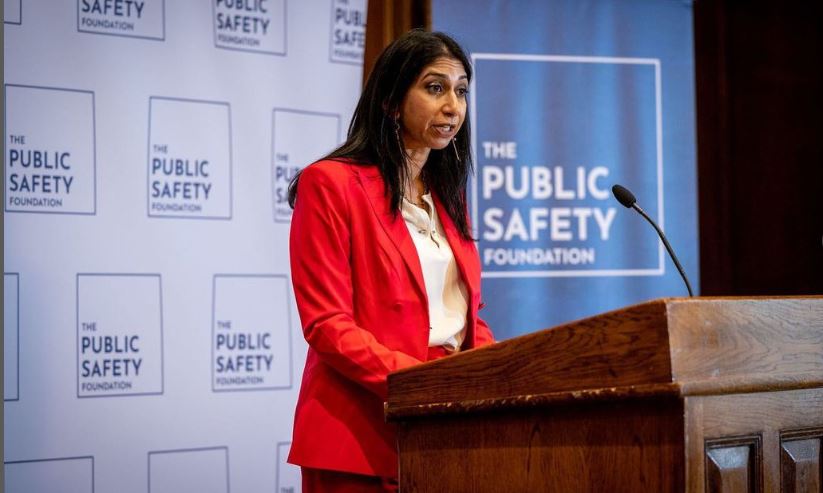Suella Braverman is a key figure in British politics and the current UK Home Secretary who has garnered attention not just for her policies and rhetoric but also for her personal beliefs, including her religious background. As one of the most senior political figures of Indian origin in the UK, Braverman’s cultural and religious heritage plays an essential role in shaping her identity.
Suella Braverman’s Early Life and Religious Background
Suella Braverman was born in 1980 to parents of Indian descent. Her mother, Uma Fernandes was a nurse and a local councillor in Brent, and her father, Christie Fernandes, worked for a housing association. Both parents emigrated to the UK from Kenya and Mauritius, respectively, with roots in the Goan Indian community.
Braverman grew up in a multicultural and multi-religious environment, but her primary religious affiliation is with Buddhism. Raised as a practicing Buddhist, Braverman has openly discussed her faith on several occasions. Buddhism, often associated with values such as compassion, mindfulness, and non-violence, contrasts with the sometimes hardline political stance she takes in her role as Home Secretary.
Though Braverman’s religious background may not always be at the forefront of her public life, it remains a significant aspect of her identity. She has often mentioned her practice of meditation, which is rooted in Buddhist traditions, and how it helps her manage the pressures of political life. While her policies may not always align with Buddhist teachings of compassion, it is interesting to see how she balances her personal faith with the demands of politics.
Buddhism in Suella Braverman’s Life
Buddhism, a religion founded by Siddhartha Gautama (the Buddha) in the 5th century BCE, emphasizes the path to enlightenment through wisdom, ethical conduct, and mental discipline. Braverman’s involvement in Buddhism appears to center around mindfulness and meditation rather than strict doctrinal adherence.
In various interviews, Braverman has expressed how her meditation practice is essential for maintaining calm and focus in her high-pressure role. She has said that she practices regularly, and this helps her navigate the political arena’s stressful environment. In a 2022 interview, Braverman shared, “Meditation has been a constant for me, helping me find balance and perspective even when the world around me is chaotic.”
Her particular connection with Buddhism reflects a modern, individualized approach to the religion, where the practice of mindfulness and inner peace is prioritized over traditional rituals and temples. While she has not been vocal about Buddhism influencing her policies, she has acknowledged the role of her faith in keeping her grounded amid political controversies and challenges.
Suella Braverman’s Political Journey and Religious Influence
Although Braverman is a practicing Buddhist, her political views and policies do not always align with the generally pacifist and compassionate image of Buddhism. As a politician, Braverman is associated with the right wing of the Conservative Party which is known for her firm stance on immigration, law enforcement, and national security.
For example, Braverman has been at the center of some of the UK government’s most contentious policies concerning immigration and asylum seekers. As Home Secretary, she has endorsed stricter immigration controls and policies, such as the Rwanda deportation plan, which involves sending asylum seekers to Rwanda for processing.
However, it is essential to recognize that many individuals’ religious beliefs may not directly translate into political decision-making, especially in a secular state like the UK. Braverman’s policies and decisions seem to be shaped more by her political ideology and the responsibilities of her office rather than her personal religious beliefs. Her role as Home Secretary, which requires her to address issues like immigration control and crime, means that pragmatism often supersedes personal faith in her decision-making process.
Criticism and Controversy Surrounding Braverman’s Faith and Policies
Suella Braverman’s Buddhist background has occasionally been a point of discussion among critics and commentators, especially when contrasted with her firm stance on immigration. Buddhism is often seen as a religion that promotes inclusivity, tolerance, and peace, which stands in contrast to Braverman’s policies, including her rhetoric on limiting immigration and focusing on national security.
Some critics argue that her hardline approach to immigration does not align with her religious beliefs. For instance, during her tenure as Home Secretary, Braverman has faced backlash for pushing policies that seemingly contradict the Buddhist ethos of compassion and care for others. However, Braverman herself has not publicly made any connection between her policies and her religion, choosing to keep her personal faith separate from her political role.
Despite this, Braverman has received significant support from Conservative voters, who appreciate her firm approach to handling difficult political issues. Supporters argue that, as a politician, Braverman’s responsibility is to uphold the laws and protect the country’s borders rather than act based on personal religious beliefs.
The Role of Religion in British Politics
Suella Braverman’s situation highlights an interesting dynamic in British politics: the role of religion in the lives of public figures. The UK is a secular nation where political leaders are not expected to govern based on their personal religious beliefs. However, in a diverse society, religion can still play a significant role in shaping an individual’s values, work ethic, and approach to public service.
For Braverman, Buddhism seems to be a personal anchor, helping her manage the demands of political life, but it does not appear to guide her policy decisions. This separation between personal faith and professional duty is common among British politicians, who must cater to a diverse electorate and maintain a secular approach to governance.


